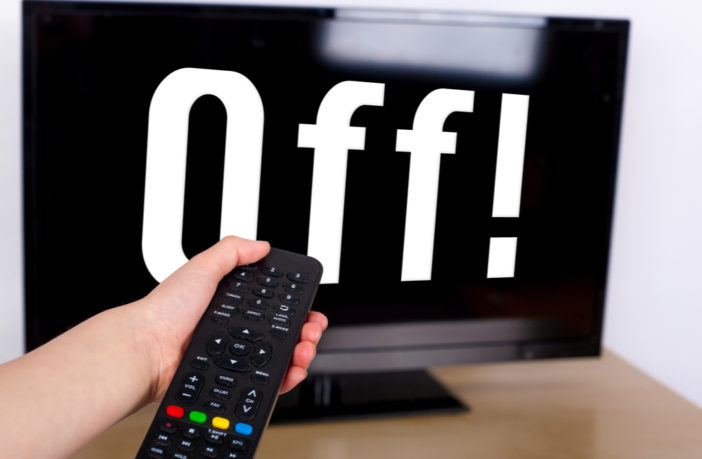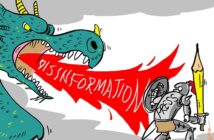As British media regulator Ofcom revokes the license of RT, the Russian international broadcaster, to broadcast in the UK, The Open University’s Dr Precious Chatterje-Doody, Lecturer in Politics and International Studies and a Russian media expert explains the decision. She outlines how the move comes after high-level political concerns over the network’s reporting of Russia’s invasion of Ukraine. But she also looks at how we got to this point and the potential consequences.
1.What is RT and what is all the fuss about?
RT is Russia’s state funded international broadcaster, formally known as Russia Today. Founded in 2005, it began essentially to promote Russian culture, but after the Russo-Georgian war of 2008 shifted to coverage that focused far more in criticising problems and issues in the so-called ‘western world’. It has been accused of spreading fake news and of acting as the Kremlin‘s propaganda bullhorn.
After an investigation of its 2018 coverage of the Skripal poisonings and the Syrian war, RT was sanctioned £200,000 for coverage which did not meet required standards of due impartiality. At that time several commentators questioned whether the network should be banned, and a raft of similar concerns were raised a few weeks ago following the Russian invasion of Ukraine. The leader of the opposition, the culture secretary and the Prime Minister all questioned what should happen about RT.
Although RT brands itself as providing an alternative perspective from that of the Western mainstream media, the reality is that whenever news events are critical to Russia’s national interest, it’s focus is Kremlin talking points. For example, it has been during Russia’s invasion of Georgia (2018); Russia’s annexation of Crimea (2014); and Russia’s poisoning of the Skripals (2018) that problematic coverage has occurred. At such times, RT gives not only and ‘alternative’, but a biased account, and one that accords with the Kremlin‘s interests. This is exactly what we have seen since Russia’s invasion of Ukraine earlier this year.
2. What is Ofcom‘s reasoning, and why now?
Ofcom responded to politicians requests for further scrutiny earlier this year by pointing out that RT was already under multiple investigations; it subsequently announced more. In fact the regulator had a total of 29 investigations open into RT and its coverage of the war in Ukraine. These usually take month to conclude.
However over recent days and weeks the Kremlin has significantly increased the restrictions on media coverage of the war at home. This has included the effective criminalisation of coverage which does not toe the Kremlin‘s line about this being a special operation rather than an invasion. Russia’s media regulator Roskomnadzor, which operates effectively as an arm of the Kremlin, has forced various outlets to take down offending content, has blocked others, and forced yet others to close down.
In light of these developments, Ofcom speeded up its decision on RT’s licence. The regulator determined that Russia’s new regulations effectively rendered the parent company of RT, ANO TV Novosti, incapable of meeting the standards required of due impartiality.
3. How is Russia responding to this development?
Senior figures at the RT network have accused Ofcom of using the war in Ukraine as a pretext for a politically motivated ban. They allege that this has been the UK’s intent all along, because RT’s ‘alternative perspectives’ are not welcome in the West. Key figures in the Russian leadership have also painted this development as an example of western aggression within a so-called information war against Russia, and warned that there will be consequences.
However, the fact of the matter is that the Russian state has already put significant pressure on alternative news providers within Russia, including the state funded broadcasters of other states, including the BBC and Germany’s DW. In the case of DW, it was blocked as a tit-for-tat measure after Germany banned RT’s German service, before an EU-wide ban came into place. Although Russia’s media environment is becoming increasingly restricted day on the day, we can expect to see this latest developments are used as a pretext for further restriction of foreign content.
4. What’s next for Russia’s media operations abroad?
In practical terms, the decision to revoke RT’s license does not have very many immediate consequences in the UK. The network had already become unavailable on Freeview and satellite services as indirect consequence of the EU wide ban on RT. What this means, is that it will prove difficult for RT to begin broadcasting here again.
In fact, the war in Ukraine has proven to be a real turning point for the network. Not only has it been banned across the EU, and now effectively in the UK, its operations in the USA have also ceased. Many staff have resigned in protest at Russia’s invasion, whilst others have been laid off due to the network having to cease production. The network was also de-monetised on YouTube and subsequently dropped, which will have dramatically reduced traffic to its programs.
However, recent comments from the Kremlin spokesman Dmitry Peskov, hint that this may not be a clear end but rather an evolution for Russia’s informational efforts. As he pointed out, RT’s content will remain available online to those who wish to seek it out, and there is some evidence in part some regions (such as the Arabic-speaking world), RT’s content remains appealing. Certainly, Ofcom’s ban does not extend to the online environment and those who wish to do so can access artiste content directly through its website.
Nonetheless latest developments decrease the network’s accessibility, and especially the ease with which people stumble across it. What is more, they threatens the heart of RT’s self branding as a top flight alternative broadcaster. Its audiences may have always been primarily online, but its studios in Washington DC, London and Moscow, were essentially status symbols that contributed to its overall self image. Being forced to close down its international studios send an important signal. Without these, the RT project (or whatever informational experiment succeeds it) will look rather different, even if it does continue in some form in other regions of the world and online.
Find out more
Read more news and analysis about the war in Ukraine from the OU’s expert academics:
ounews.co/tag/war-in-ukraine



